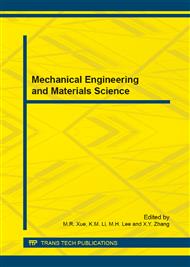p.1654
p.1658
p.1662
p.1666
p.1671
p.1675
p.1680
p.1684
p.1689
Computer Control Software Design Model Based on Improved PID Algorithm
Abstract:
The optimal design for computer control software is studied. Since computer control software is susceptible to interference during the control process, a computer control software design model based on improved PID algorithm is proposed. The PID algorithm is combined with particle swarm algorithm to calculate PID control parameters, which is viewed as evolutionary particles of the particle population, and given a certain flight speed in the search space, the speed of the particles will be adjusted iteratively and dynamically in accordance with the experience of population’s evolution calculation, in order to achieve computer control software design. The simulation results show that the proposed algorithm applied for computer control software design, can improve the control precision and meet the actual needs of computer control.
Info:
Periodical:
Pages:
1671-1674
Citation:
Online since:
December 2014
Authors:
Keywords:
Price:
Сopyright:
© 2015 Trans Tech Publications Ltd. All Rights Reserved
Share:
Citation:


